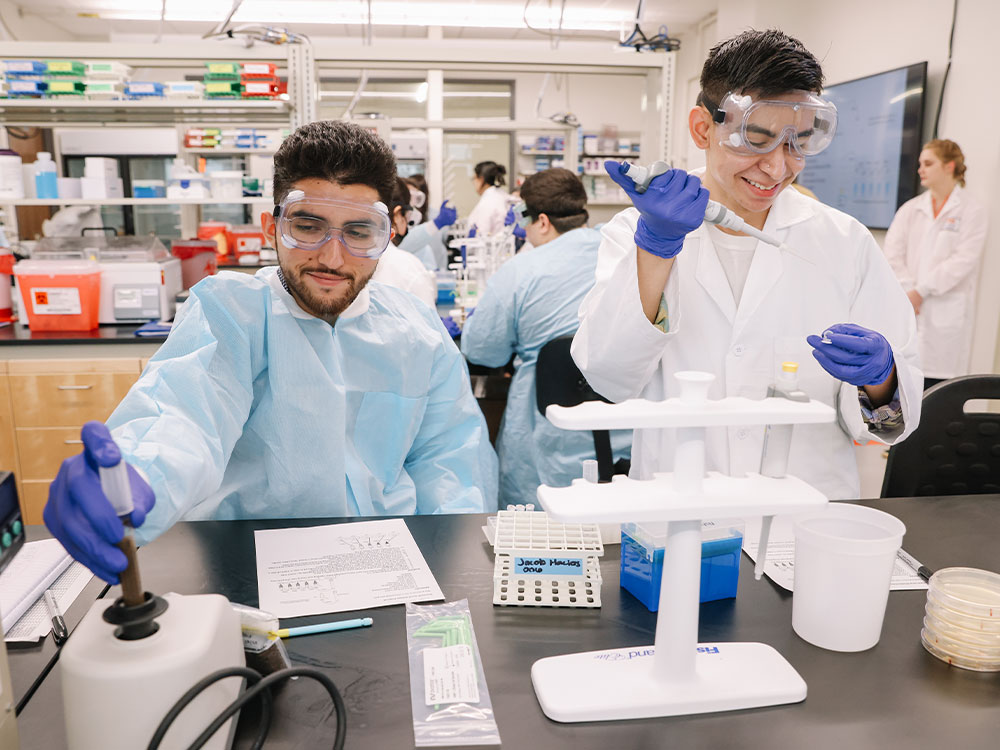
Why Pursue a PhD in Molecular Microbiology and Immunology
Upon completion of the Molecular Microbiology and Immunology Degree, students will be proficient in demonstrating knowledge and comprehension of the foundations of the immune systems in various hosts, microbial pathogenesis, host-pathogen interactions, microbial and host genomics, and biology of diseases of the immune system. Students will design and execute experiments, apply the scientific method, and apply cutting-edge knowledge and experimental tools in microbiology and immunology to solve current health challenges.
Microbiology is the study of microscopic organisms, encompassing bacteriology, mycology, parasitology, and virology. Molecular Microbiology emphasizes studies of key molecules, factors and functions in microorganisms. Multiple program faculty are engaged in research in this area. Immunology is the branch of science dealing with the components of the immune system, immunity from disease, the immune response, tolerance, and immunologic techniques of analysis. Multiple faculty at UTSA possess interests in the physiological functioning of the immune system, malfunctions of the immune system in immunological disorders, and the physical, chemical, and physiological characteristics of the components of the immune system.
Research Opportunities
Research centers, cores, installations, or companies facilitating research in Molecular Microbiology and Immunology include:

Admission & Application Requirements
Applications are submitted through the UTSA Graduate Application. Please upload all required documents (listed below) on your UTSA Graduate Application. It is the applicant’s responsibility to ensure completion and submission of the application, a nonrefundable application fee, and all required supporting documents are on file with UTSA by the appropriate application deadline.
| Molecular Microbiology and Immunology (PhD) | ||
|---|---|---|
| Admission is only available for the Fall semester | ||
| Required Degree | Bachelor's Degree from an accredited college or university in the United States or have proof of equivalent training at a foreign institution. | |
| Minimum GPA | 3.0 (on a 4.0 scale) Departments may consider GPA of last 60 semester credit hours | |
| Coursework | 18 credit hours in an area related to this graduate degree and at least 12 hours must be at the upper-division level. | |
| Transcripts* | Required from all institutions attended; international transcripts must be recorded/translated to English | |
| Credential Evaluation | Required if you have earned university-level credit from foreign institutions. Submit an evaluation of your transcripts from Educational Credential Evaluators (ECE) directly from the graduate admission application platform | |
| English Language Proficiency | 550 TOEFL Paper / 79 TOEFL Internet / 6.5 IELTS / Duolingo 100 | |
| Purpose Statement | Required | |
| Letters of Recommendation | 3 academic or professional reference(s) demonstrating your attributes for successful completion of this program (you will request these through the Graduate Admissions Application; let your recommenders know of your deadline to ensure submissions are on time) | |
| *Unofficial transcripts will be taken into consideration for admissions; however, if admitted into the program, you must submit official transcripts to the University. | ||
Application Deadlines
Applicants are encouraged to have their admission file completed as early as possible. All applications, required documents and letters of recommendation, if applicable, must be submitted by 5:00 PM U.S. Central Time on the day of the deadline. Deadlines are subject to change.
| Molecular Microbiology and Immunology (PhD) | |||
|---|---|---|---|
| Timing on Admission Decision: Completed applications will be reviewed for admission after the deadlines below. Decisions will be made and sent to applicants within a few weeks after the review date. | |||
| Application Deadlines for: | Priority | International | Domestic |
| Fall 2024 | November 1 | December 1 | December 1 |
| Spring | Not Available | Not Available | Not Available |
| Summer | Not Available | Not Available | Not Available |
Funding Opportunities
Teaching and research assistantships are offered, as well as research fellowships.
Career Options
UTSA prepares you for future careers that are in demand. The possible careers below is data pulled by a third-party tool called Emsi, which pulls information from sources like the U.S. Bureau of Labor Statistics, U.S. Census Bureau, online job postings, other government databases and more to give you regional and national career outlook related to this academic program.
While in a doctoral program, a student may earn a master’s degree provided the following conditions are satisfied:
- A student must be admitted to candidacy.
- A student is eligible to receive a master’s degree upon completion of University-wide requirements and any additional degree requirements specific to the program.
- The Doctoral Studies Committee, Department Chair, and the Graduate Associate Dean of the College must recommend students for the degree.
- The student must apply for graduation by the published deadline the semester prior to awarding the doctoral degree.
- All required coursework in the doctoral program at the time of admission to candidacy must have been taken within the previous six years.
- If the master’s degree requires a thesis, the degree cannot be awarded on the basis of the doctoral qualifying examination.
- Students will not be approved for an additional master’s degree in the same field in which an individual has previously received a master’s degree.
The Molecular Microbiology and Immunology PhD curriculum is offered through daytime courses only. Participation in the program is considered a full-time activity.


